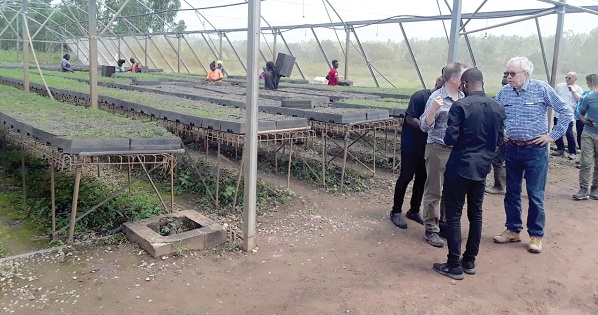
AstraZeneca supports agroforestry, forest restoration : To plant 4.5 million trees by 2025
AstraZeneca has partnered the Circular Bioeconomy Alliance (CBA) to support farmers in the Bono East Region through the Living Lab project to improve soil fertility in the region and to also support the farmers to plant cash crops such as cashew.
This is to help the farmers to improve and diversify their incomes.
The five-year project also seeks to restore the forest landscape of the Atebubu and Wiase forests, and will see the planting of 4.5 million trees by 2025.
In an interview after a field trip to the project sites, a Director of the New Generation Plantations Technical Assistance (NGPTA) providing technical assistance for the project, Andrew Heald, said: “What we are trying to do with this project is to find a balance among forest restoration, agro forestry development and growing sustainable crops”.
He said the technical team held meetings with the local communities, where the farmers told them about their challenges and how the loss of trees was impacting their lives and livelihood.
“So what we are trying to do is find a balance with natural forest restoration with indigenous trees and also growing cashew and mango for the local farmers to diversify their incomes,” he stated.
Benefits
Mr Heald said the project was currently benefitting 11 communities in the Bone East Region.
“The project started on paper two years ago, but we actually started planting in February last year, and we planted 150,000 trees.
“This year, we plan to plant 500,000 trees. We just delivered 12,000 seedlings to the farmers in the first week of May,” he stated.
In a separate interview, the President of AstraZeneca’s sub-Saharan Africa Business, Barbara Nel, said the pharmaceutical company intended to plant 50 million trees globally by the end of 2025, out of which 4.5 million would be planted in Ghana.
She said the company would do this in partnership with local governments and non-profit organisations.
“Our core business is pharmaceuticals and we have been in Africa for 50 years. We will continue to be in Africa and work alongside the ministries of health and government and also to come up with projects such as this,” she stated.
Commenting on the project, she said, “I am pleased to have been able to meet community leaders, local farmers and other stakeholders involved in this Living Lab and to see first-hand, the positive impact.
“Together, we can make a difference. Working with local communities, respecting local knowledge and traditions and merging these with the latest technology and multi-sectoral expertise is helping to restore local livelihoods and build sustainable communities,” she stated.
Stakeholder platform
The Chairman of the Multi-Stakeholder Platform, which has been formed to steer the project, Anthony Owusu, said the platform had created an avenue where both farmers and opinion leaders came together to take decisions that benefitted both parties and their communities.
He commended the technical team for delivering the seedlings and inputs ahead of the rainy season.
“We informed them that due to the weather conditions, if they want to help us then the seeds should come within April-May and fortunately, they met this deadline and delivered all the seeds by the first week of May.
“We the farmers are very excited about this project. Over the years, we have always wanted to go into cashew farming but getting the seeds and inputs was the challenge. So we are fortunate that this project came in,” he stated.
